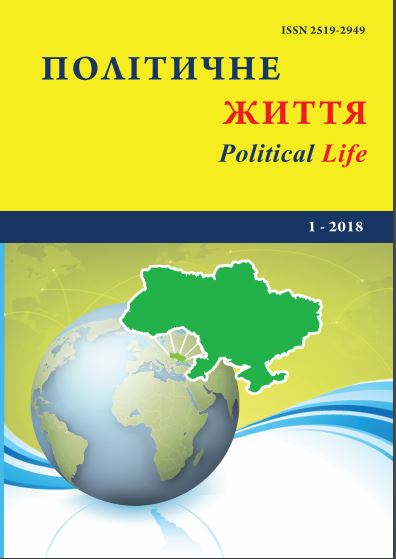Civil society of Romania: the experience of combating corruption.
DOI:
https://doi.org/10.31558/2519-2949.2018.1.5Keywords:
Romania, civil society, corruptionAbstract
The author researches the process of overcoming the legacy of many years of totalitarian oppression by Romania on the example of counteracting the rooted corruption practices in all spheres of the social and political role. The important role of the national civil society in the democratization of Romania is emphasized. The study examines the dynamics of civic activism since 1989 and notes that the strict authoritarianism of the period of N. Ceaușescu rule, when the elements of civil society were practically absent, had a decisive influence on the formation of Romanian civil society. The author notes that this circumstance distinguished Romanian from the other Central and Eastern European states (especially from Poland and Czechoslovakia).
The article draws attention to the fact that the democratic transit in Romania and the movement towards European integration contributed to the gradual formation of Romanian civil society, but at the same time the population had a low civic competency, weak interest in politics, and tolerated corruption practices. It analyzes one of the first major actions (“The Coalition for a Clean Parliament”, 2004), which resulted in determination of the criteria for the Romanian parliament candidates and withdrawal of those candidates who did not comply with them. It is emphasized that in the absence of transparent state policy, the public disclosure of politicians became an effective anti-corruption mechanism, used by the civil society institution in cooperation with the media. It is stated that at that time the civil society was in fact a movement of the most active Romanian non-government organizations, but it did not include the broad masses of the population and did not involve them in unconventional forms of political activity.
The author notes that the Romanian civil society as a community, united by common interests of collective development, has gone through four stages of formation. They were caused by the events that triggered massive popular protests: 1) protests against the government health care reform project (January 2012); 2) protests against the anti-environmental Roșia Montană project (September 2013 – February 2014); 3) anti-government protests after the fire in the Colectiv nightclub; 4) anti-government protests against corruption (January 2017 – January 2018).
References
Авинери Ш. Партии, социально-культурная медиация и роль гражданского общества / Ш. Авинери // Полис. ‒ 1994. ‒ № 1. ‒ С. 141‒147.
Герасимчук С. Антикорупційний Майдан. Що спричинило масові протести у Румунії [Електронний ресурс]. – Режим доступу: http://www.eurointegration.com.ua/articles/2017/01/23/ 7060521/
Губрієнко О. Особливості політико-правових змін у країнах Центрально-східної Європи (на прикладі Болгарії та Румунії) [Електронний ресурс]. – Режим доступу: http://www.stattionline.org.ua/filologiya/79/13419- osoblivosti-politiko-pravovix-zmin-u-kra%D1% 97nax-centralno-sxidno%D1%97-yevropi-na-prikladi-bolgari% D1%97-ta-rumuni%D1% 97.html
Кушнарьов І. В. Інструменти боротьби з політичною корупцією у країнах Центральної та Східної Європи: оцінка ефективності на прикладі Румунії та Болгарії / І. В. Кушнарьов // Політикус. ‒ 2017. ‒ № 4. ‒ С. 58‒61.
Кушнарьов І. В. Політична корупція в Румунії: роль громадянського суспільства у протидії їй / І. В. Кушнарьов: Матеріали всеукр. наук.-практ. конф. (25–26 серпня 2017 р., м. Запоріжжя) [«Суспільні науки та сучасність: актуальні питання»]. ‒ Запоріжжя : Класичний приватний університет, 2017. – C. 89–93.
Перепелиця Г. Боротьба з корупцією: румунські уроки для України [Електронний ресурс]. – Режим доступу: http:// uainfo.org/blognews/1486453321-borotba-z-koruptsieyu-rumunski-uroki-dlya-ukrayini.html
Пилип Я. Ю. Інституційні гарантії забезпечення прав і свобод громадян у сфері запобігання та протидії корупції за законодавством Румунії. Порівняльно-аналітичне право. ‒ 2015. ‒ № 5. ‒ С. 213‒217.
Румунська Коаліція за чистий парламент. У пошуках чесності в політиці [Електронний ресурс]. – Режим доступу: https://maidan.org.ua/2011/09/borotba-z-politychnoyu-koruptsijeyu-u-postkomunistychnij-evropi/
Сааков В. У Румунії суд оголосив неконституційною частину реформи юстиції [Електронний ресурс]. – Режим доступу: http://p.dw.com/p/2rnns
Федоренко С. Румунія: народ проти корупції [Електронний ресурс]. – Режим доступу: https://dt.ua/international/rumuniya-narod-proti-korupciyi-.html
Coaliţia pentru un Parlament Curat [Електронний ресурс]. – Режим доступу: www.sar.org.ro/coalitiapentru-un-parlament-curat-2004/
Coaliţia pentru un Parlament Curat – Alegeri Europene [Електронний ресурс]. – Режим доступу: http://sar.org.ro/coalitia-pentru-parlament-curat-2007-alegeri-europene/
Deletant D. Ceaușescu and the Securitate: Coercion and Dissent in Romania, 1965‒1989 / D. Deletant. ‒ London : M.E. Sharpe, 1995. ‒ 456 р.
Fourth Evaluation Round. Corruption prevention in respect of members of parliament, judges and prosecutors. Evaluation Report Romania [Електронний ресурс]. – Режим доступу: https://rm.coe.int/16806c7d05
Le Rapport de Conformité. Roumanie [Електронний ресурс]. – Режим доступу: https://rm.coe.int/quatrieme-cycle-d-evaluation-prevention-de-la-corruption-des-parlement/168077e15a
Olteanu T. The Romanian people versus corruption. The Paradoxical Nexus of Protest and Adaptation / T. Olteanu, S. Beyerle // The Open Journal of Sociopolitical Studies. ‒ № 10 (3). ‒ P. 797‒825.
Poenaru F. Romanian protests: A cake with three layers (and a cherry on top) [Електронний ресурс]. – Режим доступу: http://www.focaalblog.com/2017/02/27/florin-poenaru-romanian-protests-a-cake-with-three-layersand-a-cherry-on-top/#sthash.bah2qnKb.dpuf

